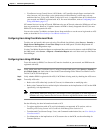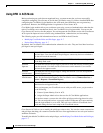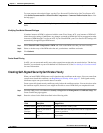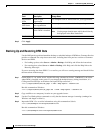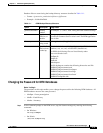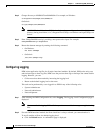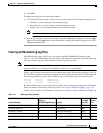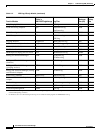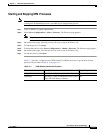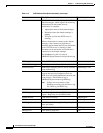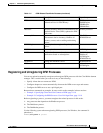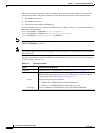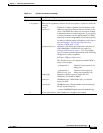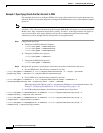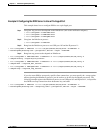
11-15
User Guide for Device Fault Manager
OL-11390-01
Chapter 11 Administering DFM (Advanced)
System Administration
Registering and Unregistering DFM Processes
You can use pdcmd to manually unregister and reregister DFM processes with the CiscoWorks daemon
manager. This is useful when you want to do any of the following:
• Specify clients that can connect to DFM.
• Configure adapters to restart automatically whenever the DFM server stops and restarts.
• Configure the DFM server to use a privileged port.
Because these commands are complex, be sure to refer to the examples in these sections:
• Example 1: Specifying Clients that Can Connect to DFM, page 11-18
• Example 2: Configuring the DFM Server to Use a Privileged Port, page 11-19
Before registering a process, you must unregister the related processes in this order:
1. Any processes that depend on the DfmServer process.
2. The DfmServer process.
3. The DfmBroker process.
Use the following syntax when unregistering DFM processes (for Windows, the command is
pdcmd.exe):
NMSROOT
/bin/pdcmd -u
process
FHServer Fault History server, a program that runs
backend services for Fault History.
EPMServer,
EPMDbEngine,
FHDBEngine,
FHDbMonitor
Interactor Provides inventory and device information to the
Detailed Device View (DDV); updates the DDV
with events.
InventoryCollector
InventoryCollector Synchronizes voice device inventory with
infrastructure device inventory. Handles all
inventory events, such as adding and deleting
devices.
ESS, TISServer,
DFMOGSServer
INVDbEngine Inventory database engine—Repository for
devices.
None
INVDbMonitor Inventory database monitor. INVDbEngine
NOSServer Notification Server monitors alerts and sends
notifications based on subscriptions.
EPMDbEngine,
EPMServer,
INVDbEngine,
DFMOGSServer
PTMServer Polling and thresholds server. DFMOGSServer
TISServer Inventory server. EssMonitor,
INVDbEngine
Table 11-3 DFM-Related CiscoWorks Processes (continued)
Name Description Dependency



